
|
|
| Custom Hay Services By Jim & Donna Nixon, La Grange, Missouri |
 | The first step in your hay harvest is to mow the hay down so it can be dried and bailed. This is the most time, and fuel consuming part of the process. |
| We use a 10 foot mower/conditioner to mow your hay. The conditioner processes the crop material so the hay dries faster. This is especially helpful when working with shorter windows of opportunity due to weather conditions. | 
| |
 | The hay is mowed off by the knives on the spinning disks. It then passes between two large rubber rollers. This conditioning process crushes the crop material and skims the waxy coating off the plant material, which allows the moisture to escape faster. Mowing with a mower/conditioner generally shortens the drying time by at least one day. |
| Our equipment ensures a clean cut, even in thick crops such as grass and clover. By shaving the crop off close to the ground, you can be assured that you are getting the most hay from your harvest. Also, cutting the crop short stimulates the plant to regrow more quickly. | 
| |
| After mowing your hay, and allowing it to dry (cure) properly we'll then rake it into windrows for bailing using our modern V rake which is gentle on the crop, as well as being very fast, thus reducing time and fuel comsumption which keeps your costs down. | 
| |
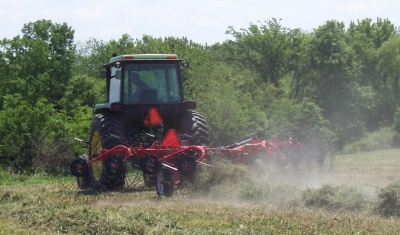 | 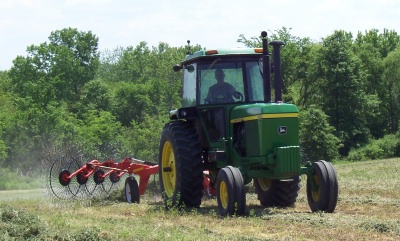 |
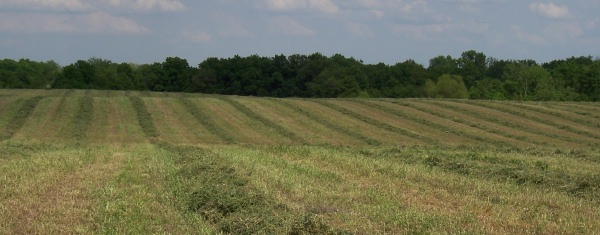 | Once the raking has been completed, the hay will be allowed to finish drying since the raking has brought the bottom of the window up and will allow the moisture to escape. This normaly takes just a few hours after the initial drying time. |
| Once the hay has completely dried, and has been tested electronicly to ensure the proper moisture content, the bailing process will begin. | 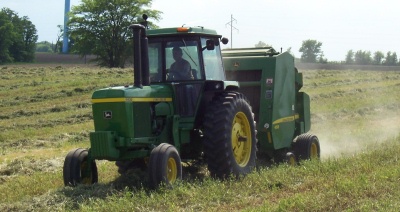
| |
 | Using our late model modern round bailer, this process is fairly quick. Depending on the thickness of the windrows, bales can be formed very quickly. |
| Once the bale is formed and wrapped with net wrap (twine is optional), the bale is ejected by the bailer, and the next bale is started. | 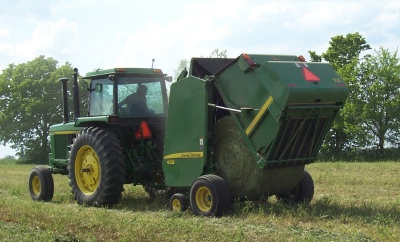
| |
 | The bales are wrapped with John Deere Cover Edge Net Wrap, which has an elastic edge which actully snaps over the edge of the bale to help maintain the shape, and to keep moisture out. |
| Another good looking 4 X 5 bale being ejected. The 4 X 5 bales have become very popular. They are perfect for customers with smaller tractors that can't handle the larger and heavier 5 X 6 bales, as well as being easier to transport since two bales end to end equal 8 feet, which illiminates the need for wide load permits by truckers. The average weight of a 4 X 5 bale is approximately 1100 pounds. | 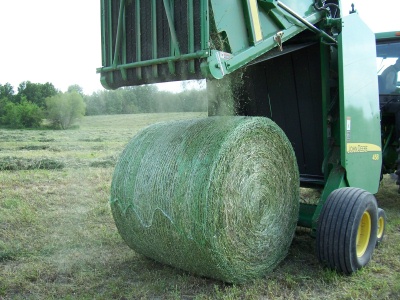
| |
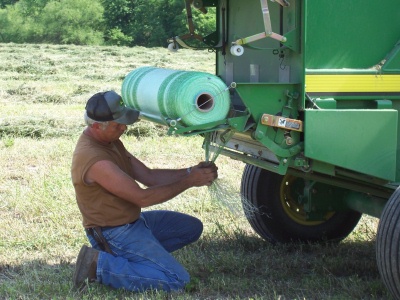 | Here, Jim is starting a new roll of Net Wrap. |
| Square bailing services are available for those customers who request it. These are preferred by small acreage owners who have smaller livestock as pets or are part time producers. The smaller bales are easier to handle and can be easily stored inside. | 
| |
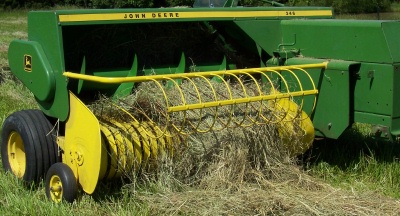 | The important thing to remember with small square bales, is it's imperative that the hay is dry when baled. Since most small square bales are stored inside buildings, it's not worth the risk of fire from damp hay heating up and spontaneously combusting. |
| Our square bailer is a twine tie bailer. It will use the customers choice of nylon or sisal twine. Wire tying is not an option. | 
| |
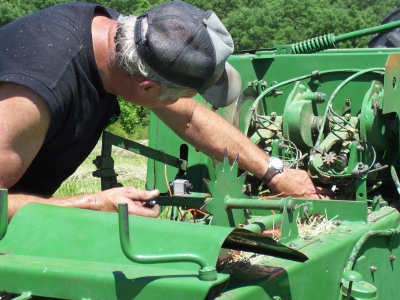 | Jim making field adjustments to the twine knotters. As with any machine, periodic adjustments need to be made to keep everything working just right. |